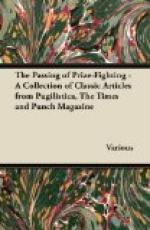The occasion that established his reputation with the pen was a Natural History essay. We were given five sheets of foolscap, two hours and our own choice of subject. I chose the elephant, I remember, having once been kind to one through the medium of a bag of nuts.
Frederick D. Milroy headed his effort “THE FERT” in large capitals, and began, “The fert is a noble animal—” He got no further, the extreme nobility of the ferret having apparently blinded him to its other characteristics.
The other day, as I was wandering about on the “line,” dodging Bosch crumps with more agility than grace, I met Milroy (Frederick Delane) once more.
He was standing at the entrance of a cosy little funk-hole, his boots and tunic undone, sniffing the morning nitro-glycerine. He had swollen considerably since our literary days, but was wearing his hair as red as ever, and I should have known it anywhere—on the darkest night. I dived for him and his hole, pushed him into it, and re-introduced myself. He remembered me quite well, shook my chilblains heartily, and invited me further underground for tea and talk.
It was a nice hole, cramped and damp, but very deep, and with those Bosch love-tokens thudding away upstairs I felt that the nearer Australia the better. But the rats! Never before have I seen rats in such quantities; they flowed unchidden all over the dug-out, rummaged in the cupboards, played kiss-in-the-ring in the shadows, and sang and brawled behind the old oak panelling until you could barely hear yourself shout. I am fond of animals, but I do not like having to share my tea with a bald-headed rodent who gets noisy in his cups, or having a brace of high-spirited youngsters wrestle out the championship of the district on my bread-and-butter.
Freddy apologised for them; they were getting a bit above themselves, he was afraid, but they were seldom dangerous, seldom attacked one unprovoked. “Live and let live” was their motto. For all that they did get a trifle de trop sometimes; he himself had lost his temper when he awoke one morning to find a brawny rat sitting on his face combing his whiskers in mistake for his own (a pardonable error in the dark); and, determining to teach them a lesson, had bethought him of his old friend, the noble fert. He therefore sent home for two of the best.
The ferrets arrived in due course, received the names Burroughs and Welcome, were blessed and turned loose.
They had had a rough trip over at the bottom of the mail sack and were looking for trouble. An old rat strolled out of his club to see what all the noise was about, and got the excitement he needed. Seven friends came to his funeral and never smiled again. There was great rejoicing in that underground Mess that evening; Burroughs and Welcome were feted on bully beef and condensed milk, and made honorary members.
For three days the good work went on; there was weeping in the cupboards and gnashing of teeth behind the old oak panelling. Then on the fourth day Burroughs and Welcome disappeared, and the rats swarmed to their own again. The deserters were found a week later; they had wormed through a system of rat-holes into the next dug-out, inhabited by the Atkinses, and had remained there, honoured guests.




